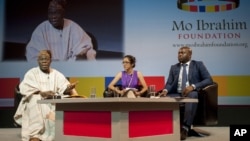The Mo Ibrahim Foundation has released its annual index of governance in Africa. The report shows continued small improvement continent-wide, although performance varied greatly from country to country.
This year’s annual Mo Ibrahim African Governance Index came as something of an anticlimax: many of the 52 nations maintained their spots from last year, with tiny Mauritius at the top and volatile Somalia at the bottom.
The charitable foundation said it has moved back the date for awarding the $5 million African leadership prize, in an attempt to keep attention focused on the index instead of the lucrative award.
This year’s index, released Monday, reveals that in the past five years, the continent’s overall governance has improved only slightly, with an average improvement of less than one point, out of a maximum score of 100.
Mo Ibrahim Index of African Governance Director Liz McGrath points out some highlights of the report.
"So we have seen that at the continental level, the Ibrahim Index shows that overall governance has slightly improved over the last five years, but this rate of improvement has been slower than in the previous five-year period. And we have also seen that the drivers of governance improvement on the continent have changed over the past 10 years. So whereas sustainable economic opportunity was the main driver between 2005 and 2009, since 2009 overall governance has been driven by participation in human rights and human development," said McGrath.
The index ranks countries based on human development, safety and rule of law, human rights, and sustainable economic opportunity.
The rankings show an overall continental improvement in health indices, despite a raging Ebola outbreak in West Africa. The data for this year’s report were collected before the first mass Ebola outbreaks were reported.
But McGrath says the index measures health through many variables, which include maternal health, immunizations, nourishment and sanitation.
“These indicators are not necessarily direct proxies for a crisis like Ebola. So it is important just to basically look at the fact that these things are improving on the continent, these measures are, definitely, perhaps in large part to the Millennium Development Goals, getting better in Africa," she said.
After Mauritius, Cape Verde, Botswana, South Africa and Seychelles round out the top five. Some traditionally low-ranked countries, among them Guinea, Zimbabwe and Chad, have made large strides in the past year, although not enough to lift them high in the rankings.
For the eighth consecutive year, lawless, violent Somalia scored worst in the class, with a dismal 8.6 points out of 100. Somalia's government is more stable than it once was, but the country remains awash in weapons, reliant on food aid, and perpetually troubled by al-Shabab militants and inter-clan clashes.
As for the $5 million question, the board will meet to discuss the next leadership prize at the beginning of 2015. The award goes to a democratically elected African leader who has shown exceptional leadership and served his or her mandated term and left office in the past three years.
At this time, barely a handful of African heads of state, many of whom have ruled for decades, meet those criteria.







